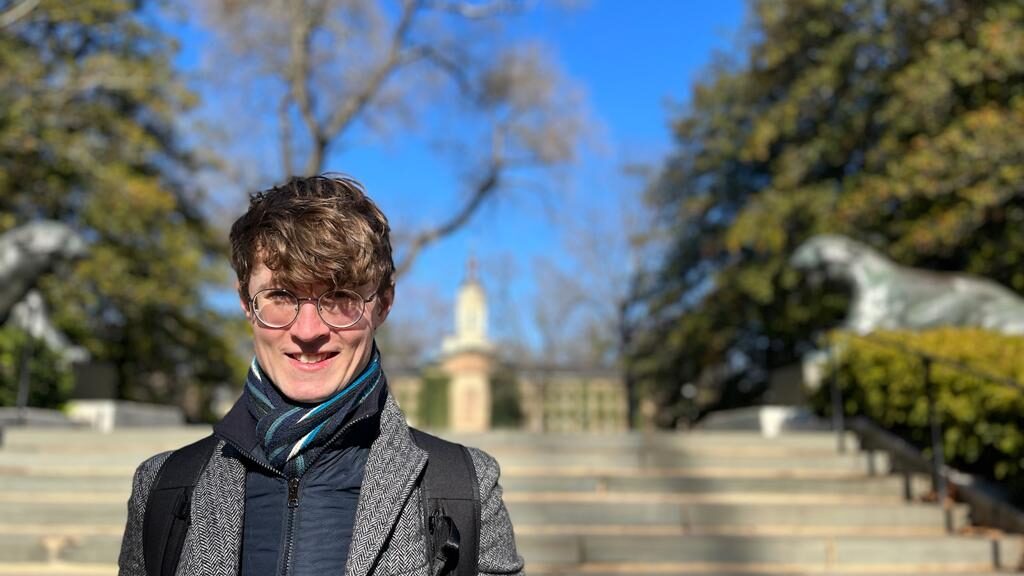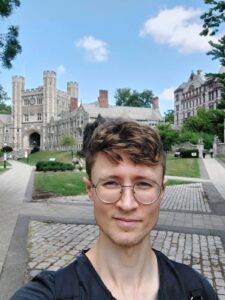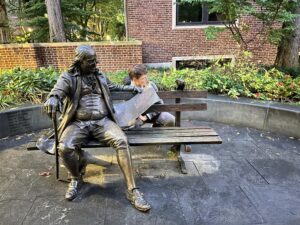CERGE-EI encourages its PhD students to conduct part of their research abroad. Many students choose universities in the US, such as Columbia University, New York University, or Princeton University. Our PhD in Economics student Rastislav Rehák has recently returned from Princeton and shared his experience with us.
Why did you decide to apply for academic mobility?
The main reasons for me were to get specialized feedback on my current work and expose myself to a new environment to find and develop new research ideas.
Why did you choose Princeton and what was the application process?
I chose Princeton mainly because of Pietro Ortoleva. I have a specific project about decision confidence inspired by cognitive science. Pietro has been interested in this topic and had some collaborations with cognitive scientists. Hence, I wanted his guidance on this project and general advice on my career choices. I also wanted to meet his students with whom I could discuss similar ideas.
The first step was to contact my potential Princeton host to see whether he wanted to and could officially invite me. In this respect, I am lucky that my supervisor Filip Matějka is well connected, and he could establish contact quickly. I am not sure how difficult it would have been if I had initiated the contact on my own. I think it is a good idea to leverage some established contacts at this initial stage.
The rest was just a lot of administrative stuff: finding funds for mobility (CERGE-EI has several great possibilities), applying for grants, following Princeton application procedures and guidelines (for example, I had to get some unusual vaccines), visa, housing, etc. Overall, it took me around 6 months to make a decision and arrange everything.
What are the benefits of mobility for your research?
Off the top of my head, I can think of three main benefits. First, I could get specialized feedback on my projects. Second, being present at internal seminars and discussions made it easier to grasp what people at Princeton were currently thinking about and where my field was going. Third, I could find new contacts and initiate potential collaborations.
What are the benefits of mobility for you personally?
Obviously, the most exciting aspect of mobility is meeting new people. Moreover, staying for a longer period of time at some place (with all the mundane things that it entails) enables one to better experience the environment and get new perspectives on one’s own life. I have been very curious about experiencing some aspects of life in the US.
So what was it like to live in Princeton?
Princeton is a charming little town. I enjoyed my stay there very much. On one hand, much of the activity at Princeton revolves around the university and there is not much to do beyond studying and doing research. For example, when there are no classes and people do not need to be there, they leave and it’s very calm. On the other hand, Princeton is relatively close to New York City. I heard some people were even commuting from NYC. If one needs some action, it is not too far. For example, a few CERGE-EI alumni live in New York City. Our alumni office connects alumni and students on mobility, so thanks to that, I had an opportunity to meet one of them, Jaroslav Borovička, Associate Professor at New York University, which was great.
One aspect I found slightly annoying is how life in Princeton is built around cars: supermarkets are far outside the town, street lights are virtually non-existent, and public transportation is not ideal.
What did you like most about your research stay and what was the most challenging?
I liked the people I met during my research stay. What I found the most challenging was to use as little time as possible on projects and responsibilities not directly related to my main goals at the mobility.
Was the funding enough to survive on during your mobility stay?
A combination of funds from several sources (GEOCEP and Charles University Mobility Fund in my case) was just enough for a decent living. The biggest items were the university fees with insurance, housing, and transportation. A pro tip: decent food can be often found at lunch seminars, which can help with budget constraints. 😀
What would you advise students who plan to go for mobility? Is it better to go with a draft paper or with a pure research idea and proposal?
I don’t think there is a universal answer; both are fine and it depends on specific students and their expectations. I was lucky enough to have two mobilities that were ideal for me: a shorter one early in my 3rd year where I discussed early-stage ideas and proposals and got inspired by a new environment, and the longer mobility at Princeton in my 6th year where I got more specialized feedback on developed projects and I felt more confident in discussing new ideas because I was already more familiar with my field.


